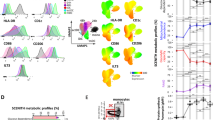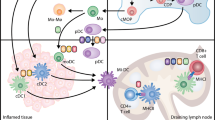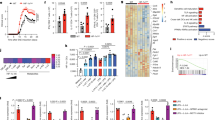Abstract
Tolerogenic dendritic cells (tolDCs) are assessed as immunomodulatory adjuvants to regulate autoimmunity. The underlying gene expression endorsing their regulatory features remains ill-defined. Using deep mRNA sequencing, we compared transcriptomes of 1,25-dihydroxyvitaminD3/dexametasone-modulated tolDCs with that of non-modulated mature inflammatory DCs (mDCs). Differentially expressed genes controlled cellular interactions, metabolic pathways and endorse tolDCs with the capacity to regulate cell activation through nutrient and signal deprivation, collectively gearing tolDCs into tolerogenic immune regulators. Gene expression differences correlated with protein expression, designating low CD86 and high CD52 on the cell surface as superior discriminators between tolDCs and mDCs. Of 37 candidate genes conferring risk to developing type 1 diabetes (T1D), 11 genes differentially expressed in tolDCs and mDCs regulated immune response and antigen-presenting activity. Differential-expressed transcripts of candidate risk loci for T1D suggest a role of these ‘risk genes’ in immune regulation, which targeting may modulate the genetic contribution to autoimmunity.
This is a preview of subscription content, access via your institution
Access options
Subscribe to this journal
Receive 6 digital issues and online access to articles
$119.00 per year
only $19.83 per issue
Buy this article
- Purchase on Springer Link
- Instant access to full article PDF
Prices may be subject to local taxes which are calculated during checkout





Similar content being viewed by others
References
Woittiez NJ, Roep BO . Impact of disease heterogeneity on treatment efficacy of immunotherapy in type 1 diabetes: different shades of gray. Immunotherapy 2015; 7: 163–174.
Ostrov BE . Immunotherapeutic biologic agents in autoimmune and autoinflammatory diseases. Immunol Invest 2015; 44: 777–802.
Kim KS, Surh CD . Induction of immune tolerance to dietary antigens. Adv Exp Med Biol 2015; 850: 93–118.
Gibson VB, Nikolic T, Pearce VQ, Demengeot J, Roep BO, Peakman M . Proinsulin multi-peptide immunotherapy induces antigen-specific regulatory T cells and limits autoimmunity in a humanized model. Clin Exp Immunol 2015; 182: 251–260.
Thrower SL, James L, Hall W, Green KM, Arif S, Allen JS et al. Proinsulin peptide immunotherapy in type 1 diabetes: report of a first-in-man Phase I safety study. Clin Exp Immunol 2009; 155: 156–165.
Mansilla MJ, Selles-Moreno C, Fabregas-Puig S, Amoedo J, Navarro-Barriuso J, Teniente-Serra A et al. Beneficial effect of tolerogenic dendritic cells pulsed with MOG autoantigen in experimental autoimmune encephalomyelitis. CNS Neurosci Ther 2015; 21: 222–230.
Benham H, Nel HJ, Law SC, Mehdi AM, Street S, Ramnoruth N et al. Citrullinated peptide dendritic cell immunotherapy in HLA risk genotype-positive rheumatoid arthritis patients. Sci Transl Med 2015; 7: 290ra87.
Harry RA, Anderson AE, Isaacs JD, Hilkens CM . Generation and characterisation of therapeutic tolerogenic dendritic cells for rheumatoid arthritis. Ann Rheum Dis 2010; 69: 2042–2050.
Nikolic T, Roep BO . Regulatory multitasking of tolerogenic dendritic cells - lessons taken from vitamin d3-treated tolerogenic dendritic cells. Front Immunol 2013; 4: 113.
Ferreira GB, Kleijwegt FS, Waelkens E, Lage K, Nikolic T, Hansen DA et al. Differential protein pathways in 1,25-dihydroxyvitamin d(3) and dexamethasone modulated tolerogenic human dendritic cells. J Proteome Res 2012; 11: 941–971.
Mortazavi A, Williams BA, McCue K, Schaeffer L, Wold B . Mapping and quantifying mammalian transcriptomes by RNA-Seq. Nat Methods 2008; 5: 621–628.
Schinnerling K, Soto L, Garcia-Gonzalez P, Catalan D, Aguillon JC . Skewing dendritic cell differentiation towards a tolerogenic state for recovery of tolerance in rheumatoid arthritis. Autoimmun Rev 2015; 14: 517–527.
Simon R, Lam A, Li MC, Ngan M, Menenzes S, Zhao Y . Analysis of gene expression data using BRB-ArrayTools. Cancer Inform 2007; 3: 11–17.
Unger WW, Laban S, Kleijwegt FS, van der Slik AR, Roep BO . Induction of Treg by monocyte-derived DC modulated by vitamin D3 or dexamethasone: differential role for PD-L1. Eur J Immunol 2009; 39: 3147–3159.
Herr F, Lemoine R, Gouilleux F, Meley D, Kazma I, Heraud A et al. IL-2 phosphorylates STAT5 to drive IFN-gamma production and activation of human dendritic cells. J Immunol 2014; 192: 5660–5670.
Onengut-Gumuscu S, Chen WM, Burren O, Cooper NJ, Quinlan AR, Mychaleckyj JC et al. Fine mapping of type 1 diabetes susceptibility loci and evidence for colocalization of causal variants with lymphoid gene enhancers. Nat Genet 2015; 47: 381–386.
Suwandi JS, Toes RE, Nikolic T, Roep BO . Inducing tissue specific tolerance in autoimmune disease with tolerogenic dendritic cells. Clin Exp Rheumatol 2015; 33 (4 Suppl 92): S97–S103.
Ferreira GB, Vanherwegen AS, Eelen G, Gutierrez AC, Van Lommel L, Marchal K et al. Vitamin D3 induces tolerance in human dendritic cells by activation of intracellular metabolic pathways. Cell Rep 2015; 10: 711–725.
Zeng H, Chi H . The interplay between regulatory T cells and metabolism in immune regulation. Oncoimmunology 2013; 2: e26586.
Procaccini C, Galgani M, De Rosa V, Matarese G . Intracellular metabolic pathways control immune tolerance. Trends Immunol 2012; 33: 1–7.
Elvington M, Scheiber M, Yang X, Lyons K, Jacqmin D, Wadsworth C et al. Complement-dependent modulation of antitumor immunity following radiation therapy. Cell Rep 2014; 8: 818–830.
Skoberne M, Somersan S, Almodovar W, Truong T, Petrova K, Henson PM et al. The apoptotic-cell receptor CR3, but not alphavbeta5, is a regulator of human dendritic-cell immunostimulatory function. Blood 2006; 108: 947–955.
Bieber T . The pro- and anti-inflammatory properties of human antigen-presenting cells expressing the high affinity receptor for IgE (Fc epsilon RI). Immunobiology 2007; 212: 499–503.
Rabilloud T . Membrane proteins and proteomics: love is possible, but so difficult. Electrophoresis 2009; 30 (Suppl 1): S174–S180.
Kozulin P, Natoli R, O'Brien KM, Madigan MC, Provis JM . Differential expression of anti-angiogenic factors and guidance genes in the developing macula. Mol Vis 2009; 15: 45–59.
Bindea G, Galon J, Mlecnik B . CluePedia Cytoscape plugin: pathway insights using integrated experimental and in silico data. Bioinformatics 2013; 29: 661–663.
Bindea G, Mlecnik B, Hackl H, Charoentong P, Tosolini M, Kirilovsky A et al. ClueGO: a Cytoscape plug-in to decipher functionally grouped gene ontology and pathway annotation networks. Bioinformatics 2009; 25: 1091–1093.
Acknowledgements
This work was supported by European Union 7th Framework Programme (FP7/2007–2013) Grant 241447 (NAIMIT) and the Innovative Medicines Initiative 2 Joint Undertaking under Grant Agreement 115797 (INNODIA) (this Joint Undertaking receives support from the Union’s Horizon 2020 research and innovation program and ‘EFPIA,’ ‘JDRF,’ and ‘The Leona M. and Harry B. Helmsley Charitable Trust.’), Netherlands Organization for Scientific Research Vici Grant 918.86.611, the Dutch Arthritis Foundation (LLP16) and by an Expert Center Grant from the Dutch Diabetes Research Foundation.
Author information
Authors and Affiliations
Corresponding author
Ethics declarations
Competing interests
The authors declare no conflict of interest.
Additional information
Supplementary Information accompanies this paper on Genes and Immunity website
Supplementary information
Rights and permissions
About this article
Cite this article
Nikolic, T., Woittiez, N., van der Slik, A. et al. Differential transcriptome of tolerogenic versus inflammatory dendritic cells points to modulated T1D genetic risk and enriched immune regulation. Genes Immun 18, 176–183 (2017). https://doi.org/10.1038/gene.2017.18
Received:
Revised:
Accepted:
Published:
Issue Date:
DOI: https://doi.org/10.1038/gene.2017.18
This article is cited by
-
A comparison of curated gene sets versus transcriptomics-derived gene signatures for detecting pathway activation in immune cells
BMC Bioinformatics (2020)
-
Next steps in the identification of gene targets for type 1 diabetes
Diabetologia (2020)
-
Comparative transcriptomic profile of tolerogenic dendritic cells differentiated with vitamin D3, dexamethasone and rapamycin
Scientific Reports (2018)



